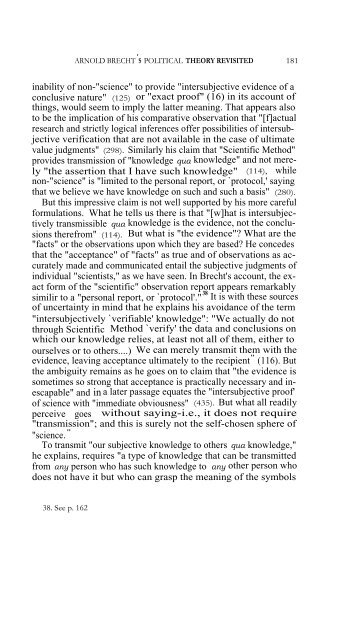ARNOLD BRECHT'S POLITICAL THEORY REVISITED Political ...
ARNOLD BRECHT'S POLITICAL THEORY REVISITED Political ...
ARNOLD BRECHT'S POLITICAL THEORY REVISITED Political ...
You also want an ePaper? Increase the reach of your titles
YUMPU automatically turns print PDFs into web optimized ePapers that Google loves.
<strong>ARNOLD</strong> BRECHT ' S <strong>POLITICAL</strong> <strong>THEORY</strong> <strong>REVISITED</strong> 181<br />
inability of non-"science" to provide "intersubjective evidence of a<br />
conclusive nature" (125) or "exact proof" (16) in its account of<br />
things, would seem to imply the latter meaning. That appears also<br />
to be the implication of his comparative observation that "[f]actual<br />
research and strictly logical inferences offer possibilities of intersubjective<br />
verification that are not available in the case of ultimate<br />
value judgments" (298). Similarly his claim that "Scientific Method"<br />
provides transmission of "knowledge qua knowledge" and not merely<br />
"the assertion that I have such knowledge" (114), while<br />
non-"science" is "limited to the personal report, or `protocol,' saying<br />
that we believe we have knowledge on such and such a basis" (280).<br />
But this impressive claim is not well supported by his more careful<br />
formulations. What he tells us there is that "[w]hat is intersubjectively<br />
transmissible qua knowledge is the evidence, not the conclusions<br />
therefrom" (114). But what is "the evidence"? What are the<br />
"facts" or the observations upon which they are based? He concedes<br />
that the "acceptance" of "facts" as true and of observations as accurately<br />
made and communicated entail the subjective judgments of<br />
individual "scientists," as we have seen. In Brecht's account, the exact<br />
form of the "scientific" observation report appears remarkably<br />
similir to a "personal report, or `protocol'." 38 It is with these sources<br />
of uncertainty in mind that he explains his avoidance of the term<br />
"intersubjectively `verifiable' knowledge": "We actually do not<br />
through Scientific Method `verify' the data and conclusions on<br />
which our knowledge relies, at least not all of them, either to<br />
ourselves or to others....) We can merely transmit them with the<br />
evidence, leaving acceptance ultimately to the recipient " (116). But<br />
the ambiguity remains as he goes on to claim that "the evidence is<br />
sometimes so strong that acceptance is practically necessary and inescapable"<br />
and in a later passage equates the "intersubjective proof'<br />
of science with "immediate obviousness" (435). But what all readily<br />
perceive goes without saying-i.e., it does not require<br />
"transmission"; and this is surely not the self-chosen sphere of<br />
"science. "<br />
To transmit "our subjective knowledge to others qua knowledge,"<br />
he explains, requires "a type of knowledge that can be transmitted<br />
from any person who has such knowledge to any other person who<br />
does not have it but who can grasp the meaning of the symbols<br />
38. See p. 162
















